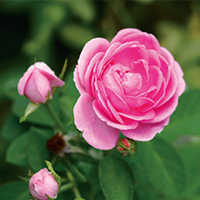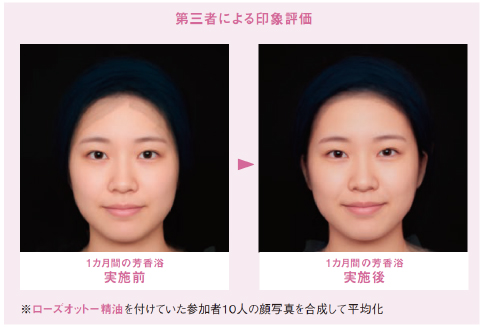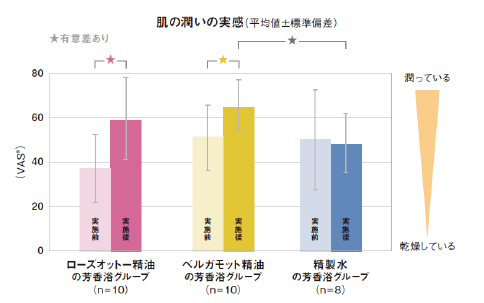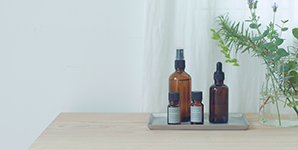アロマテラピー検定・資格の認定、学術調査研究の実施

- アロマを楽しむ
- アロマの研究・調査
- アロマサイエンス研究所
- 精油の香りによる魅力の変化
美容|Beauty
精油の香りによる魅力の変化

精油の香りは気持ちを明るくしてくれたり、リラックスさせてくれたりと、私たちの心の強い味方になってくれます。そんな香りに、自分をさらに魅力的に見せてくれる効果があるとしたらどうでしょうか。
そこで今回は、ローズオットー精油とベルガモット精油を身にまとう生活が人の魅力に与える影響を調べた実験をご紹介します。
実験方法
| 参加者 | 18~22歳の女子大学生 28名 |
|---|---|
| 精油 | ローズオットー精油(0.5%希釈) ベルガモット精油(50%希釈) |
| 対照 | 精製水 |
| 方法 | 精油または精製水のいずれかを垂らしたシールを毎日襟元に付ける芳香浴を35日間実施した。 |
実験結果

| 【実験後の顔写真がよいと評価された割合】 | 【実験後の顔写真がよいと評価された割合】 | ||
|---|---|---|---|
| ・ローズオットー精油 | 77.0% | ||
| ・ベルガモット精油 | 61.0% | ||
| ・精製水 | 48.1% | ||

【参加者自身の実感評価】
【参加者自身の実感評価】
精製水では変化がなかったのに対し、ローズオットー精油・ベルガモット精油を付けていたグループでは実施後に肌の潤いの実感が向上した。
※VAS(Visual Analog Scale)
長さ100㎜の水平線を引き、参加者の実感に基づく評価を、0㎜(とても肌が乾燥している)から100
㎜(とても肌に潤いがある)までの間に記入してもらう測定方法。
論文 熊谷千津, 他 (2018) 精油の香りを纏うライフスタイルが女子大学生の魅力に与える影響. アロマテラピー学雑誌 19(2):10-21.
Abstract : In order to clarify the influence of the lifestyle whereby
essential oil scents are used for attractiveness, two experiments were conducted. In the first intervention
experiment, twenty-eight female university students, who were the research participants, were divided in three
groups and asked to wear purified water, bergamot oil (50% concentration), or rose oil (0.5% concentration) for
about five weeks. Before and after the intervention, the participants’ anxiety (STAI, State-Trait Anxiety
Inventory), interpersonal behavioral traits (NTI-II, Nursery Trait Inventory-II), mood, and skin condition were
measured. In the second experiment involving facial attractiveness evaluation, twenty male and female university
students were asked to evaluate the faces of participants of the intervention experiment before and after the
intervention. In the intervention experiment, the rose oil group had shown a significant reduction in trait
anxiety measured using the STAI after the intervention. Additionally, according to NTI-II measurement, the mean
values for “executive ability,” “helpful activity,” and “emotional acceptance” of the rose oil group had
significantly increased. There was a significant improvement in the mood and skin condition in the bergamot oil
group and in the skin condition in the rose oil group after the intervention. The face evaluation experiment had
shown that the intervention had significantly improved some criteria in the bergamot oil group while in the rose
oil group, all criteria were significantly improved by the intervention. Furthermore, the ratio of people who
rated the faces after the intervention as more attractive than before the intervention was 48.1% for the control
group, 61.0% for the bergamot oil group, and 77.0% for the rose oil group. Therefore, the study suggests that
the continued use of essential oil scents can lead to changes internally as well in terms of external
appearance, and to improved facial attractiveness.
Key words : facial attractiveness, interpersonal behavioral trait, average face, bergamot
essential oil, rose essential oil


 アロマで毎日を私らしく
アロマで毎日を私らしく